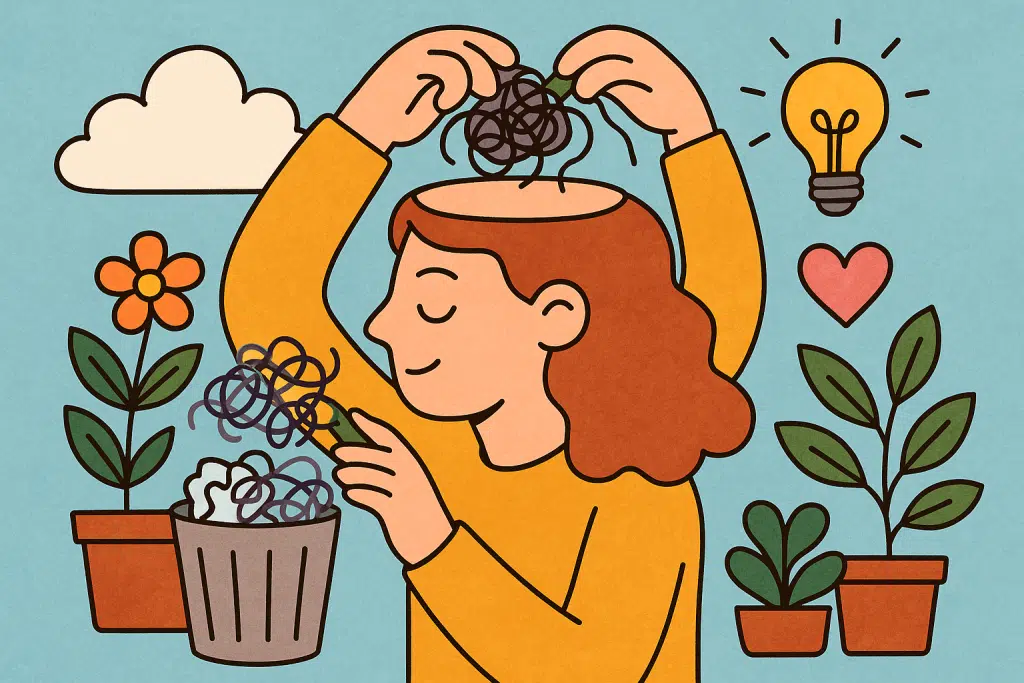The Benefits of Decluttering Your Mind
Charlotte Stone August 6, 2025
“Decluttering your mind” might sound like something off a yoga retreat brochure, but don’t dismiss it just yet. With digital overload, burnout on the rise, and the pressure to always be “on,” mental clarity has become a survival skill, not a luxury. Whether you’re working from home or juggling tasks in an office, a cluttered mind doesn’t just make you feel overwhelmed—it directly affects your productivity, decision-making, and overall sense of well-being. In this article, we’ll explore the benefits of decluttering your mind, why it’s gaining attention across professional and wellness circles, and how you can start clearing your mental space to sharpen your focus and thrive in your career and personal life.

The Rise of Mental Overload: A Hot Topic in Focus and Productivity
We’re living in the age of information obesity. According to a study published in the journal Nature Human Behaviour, the average person makes over 35,000 decisions a day (Schonberg et al., 2022). That’s not just exhausting—it’s mentally expensive. From checking emails during lunch to doom-scrolling late at night, we flood our brains with content, thoughts, and tasks that leave little room for focus or reflection.
Remote work, while flexible, often blurs the boundaries between professional and personal space. Add in back-to-back Zoom calls, Slack messages, family responsibilities, and it’s no wonder people are reporting record levels of cognitive fatigue. Decluttering your mind is no longer a weekend wellness trend—it’s a strategic necessity.
What Does It Mean to Declutter Your Mind?
Decluttering your mind isn’t about erasing thoughts or becoming a minimalist monk. It’s about:
- Letting go of unnecessary mental baggage
- Creating mental space for focus and creative thinking
- Organizing your thoughts and eliminating overwhelm
- Recognizing and shutting down mental noise (yes, that internal monologue that won’t stop)
Think of your mind like a browser with 30 tabs open. Decluttering means closing tabs that don’t serve your goals or peace of mind.
7 Real Benefits of Decluttering Your Mind
1. Improved Focus
You can’t concentrate when your brain is juggling 10 things at once. By clearing mental clutter, you allow your attention to lock in on one task at a time. It helps reduce “attention residue” — the leftover thoughts from unfinished tasks that linger and slow you down (Leroy, 2009).
2. Better Decision-Making
When your mind is calm and clear, your judgment improves. You’re able to weigh options more rationally and make confident choices.
3. Increased Productivity
A focused mind works faster and more efficiently. You’re less likely to procrastinate or multitask (which, let’s be honest, is usually just fast task-switching).
4. Greater Emotional Regulation
Mental clutter often fuels stress, anxiety, and emotional outbursts. Decluttering makes space for awareness, which helps you stay calm under pressure.
5. Enhanced Creativity
A noisy mind blocks creative flow. When your mind is clear, your brain has the bandwidth to generate new ideas, problem-solve, and innovate.
6. Deeper Reflection and Learning
Reflection helps you grow. But if your mind is always racing, you never stop to evaluate what’s working or what needs to change.
7. More Energy and Motivation
Mental clutter saps your energy. Think about how exhausting it is to think about 50 things at once. Decluttering your mind frees up cognitive energy and boosts motivation.
How to Declutter Your Mind (Without Quitting Your Job and Moving to a Cabin)
Mental decluttering doesn’t require a sabbatical. Here are realistic, practical methods that anyone can implement, even in a busy home or work schedule.
1. Brain Dump Daily
Write down everything on your mind—to-dos, worries, reminders. Don’t filter. Just empty the mental tank. This simple act clears your working memory and lets your brain reset.
2. Time Block Your Day
Create intentional windows for focused work, rest, admin tasks, and creative thinking. Time blocking prevents task overlap and reduces chaos.
3. Limit Decision Fatigue
Automate small decisions (like meal plans or outfits). Fewer decisions mean more brainpower for high-impact work.
4. Use the Two-Minute Rule
If a task takes less than 2 minutes, do it immediately. It prevents micro-clutter from building up in your mind.
5. Schedule Reflection Breaks
Every few hours, take 5 minutes to pause and breathe. Ask: What’s on my mind? What can I let go of?
6. Declutter Your Digital Space
Clean out your inbox. Mute non-essential notifications. Create folders for recurring work topics.
7. Practice Mindfulness (Even for 3 Minutes)
You don’t need to meditate for an hour. A few mindful breaths or short grounding exercises can reduce mental noise and bring clarity.
8. Journaling with Purpose
Use prompts like: “What’s taking up mental space today?” or “What do I need to release?”
9. Say No to Mental Clutter Sources
That means not agreeing to every meeting, task, or social obligation. Learn to guard your focus like it’s your most valuable resource (because it is).
Why This Topic Is Trending in 2025
In a post-pandemic world and AI-driven economy, people are rethinking productivity. It’s no longer about hustle 24/7. Instead, the emphasis is shifting to sustainable focus, deep work, and mental wellness.
Workplaces are starting to invest in cognitive wellness as a performance metric. Companies like Microsoft have launched “Focus Mode” features, while Google Calendar now prompts users to set aside time for deep focus and rest.
Increased awareness of burnout and “brain fog” has made the benefits of decluttering your mind not just relevant, but urgent.
Reflection Fuels Productivity
One often overlooked benefit of mental decluttering is space for reflection. Reflection is what helps you identify patterns, improve habits, and move forward intentionally.
If you’re always thinking, reacting, or jumping from task to task, you never stop to ask, “Is this even working for me?”
Creating time for reflection helps:
- Track progress and celebrate wins
- Pinpoint what’s draining your focus
- Improve self-awareness (a huge career asset)
Reflection turns raw experience into wisdom. That’s how you grow faster—not just by doing more, but by learning better.
Final Thoughts: Less Noise, More Growth
Decluttering your mind isn’t about escaping your responsibilities. It’s about showing up for them better. With more clarity, fewer distractions, and renewed focus, you’re able to work smarter, live healthier, and grow more intentionally.
So whether you’re an overworked remote worker, a creative feeling blocked, or just someone who wants to feel less mentally “meh,” try giving your mind the reset it needs.
Less noise. More clarity. That’s the power of mental decluttering.
References
- Sasson, R. (2022). Decluttering the Mind: How to Stop Overthinking and Reduce Mental Clutter.
https://www.successconsciousness.com
2. Smith, J. (2023). Why Mental Clutter Is Making You Tired (And How to Clear It). Psychology Today.
https://www.psychologytoday.com
3. Clear, J. (2021). Declutter Your Mental Space: Simple Ways to Think Better.
https://jamesclear.com







